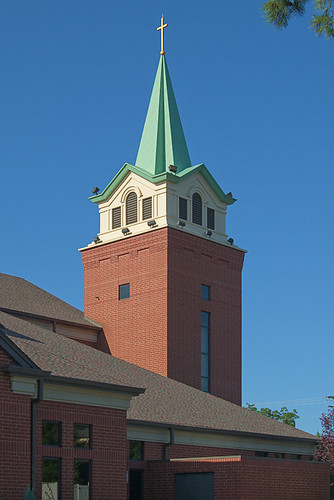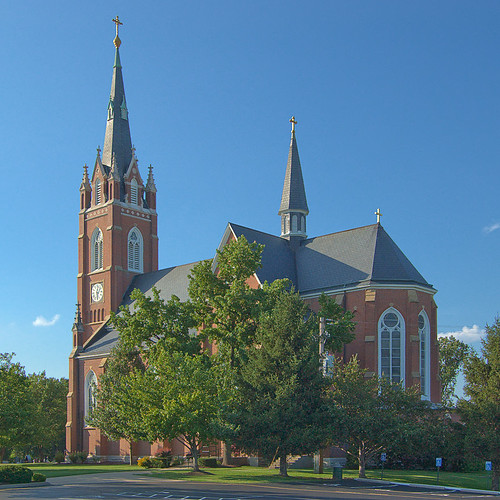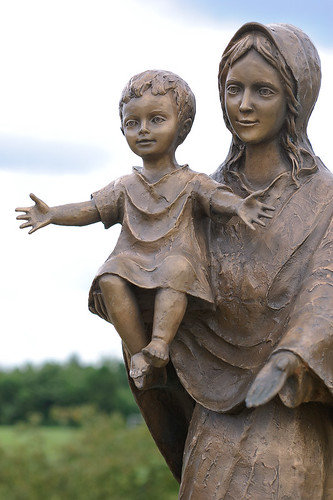
Pages
▼
Saturday, July 31, 2010
Friday, July 30, 2010
Wednesday, July 28, 2010
Photo of Saint John the Baptist Church, in Gildehaus, Missouri
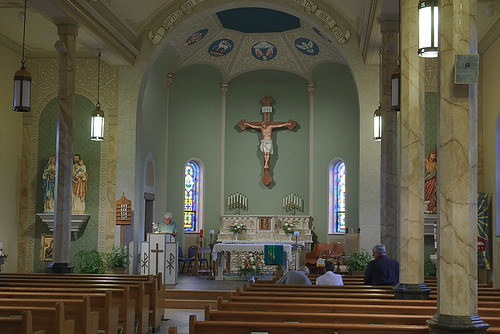
A quick snapshot of the redecorated interior of Saint John the Baptist Church, in Villa Ridge (Gildehaus), Missouri.
Click here for my photos of this church from two years ago.
Tuesday, July 27, 2010
Saturday, July 24, 2010
Saint Ann's Shrine
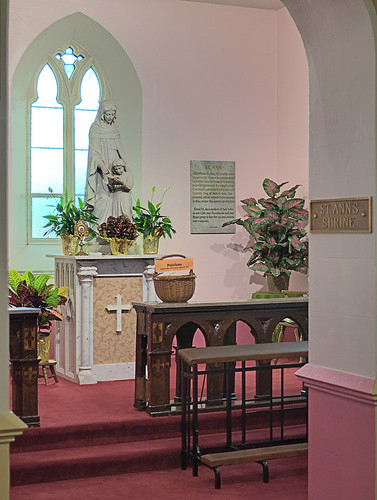
The annual novena to Saint Ann, Mother of the Blessed Virgin Mary and grandmother to Jesus, is continuing through Monday at Visitation/Saint Ann Shrine in Saint Louis.
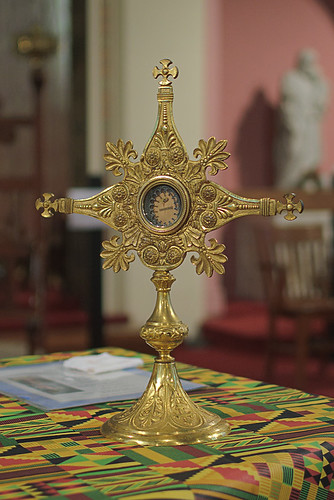
Relic of Saint Ann.
Click here for more of my pictures of this church, taken two years ago. The shrine seen in the photo above has been made since I've last visited.
Friday, July 23, 2010
Some Recent Nature Photos
A FEW NATURE pictures, mainly taken at Babler State Park, in western Saint Louis County.




The following live animals were inside of Babler's nature center:



This Zinnia was taken somewhere else:





The following live animals were inside of Babler's nature center:



This Zinnia was taken somewhere else:

Monday, July 19, 2010
Photos of Saint Martin of Tours Church, in Lemay
HERE ARE PHOTOS of Saint Martin of Tours Church, in the south Saint Louis County unincorporated community of Lemay. This parish dates from 1939, and the church building from 1951. It is located about ten miles southwest of downtown Saint Louis, near the Mississippi River, in what was once the historical common fields of Carondelet.
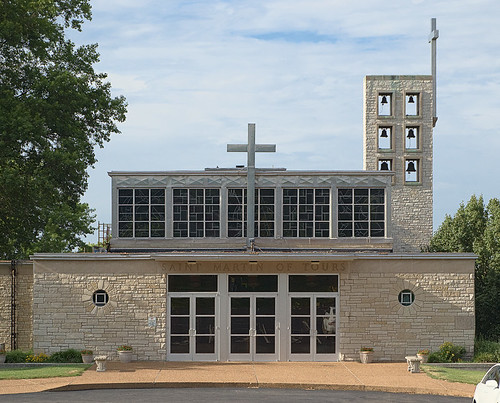
The church appears to be made of native limestone, with aluminum trim: the architectural use of that metal became popular in Art Deco building, and continued with Modernism.
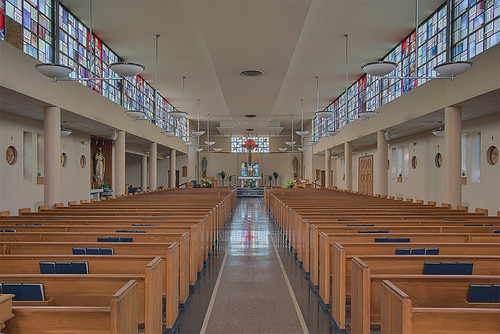
This church has a plan not much different than what is found in neo-Gothic buildings made half a century before, but uses the styling of Modernism. This was typical of the pre-Concilliar period, and this kind of artful High Modernism was quickly abandoned by the mid-1960s in favor of less Catholic designs.
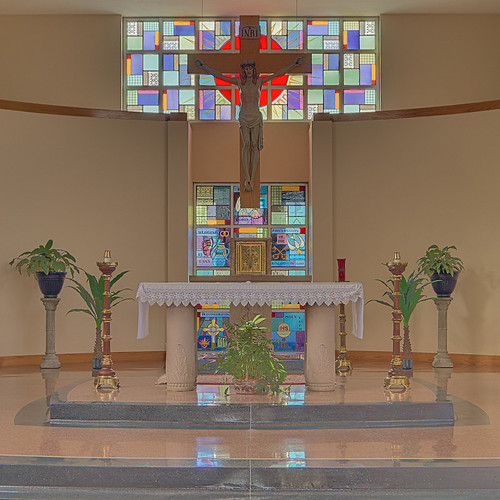
The sanctuary is spartan, yet finely made, as was common during that era. Behind the tabernacle is a new stained glass window which shows the five Luminous Mysteries of the Most Holy Rosary of the Blessed Virgin Mary. The Luminous Mysteries were proclaimed by Pope John Paul II in October of 2002.
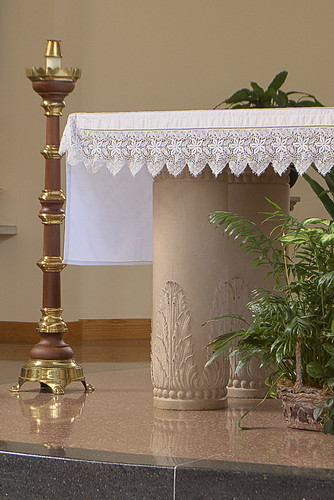
Nice linen covers the altar, which is supported by columns carved with acanthus leaves.

The tabernacle is stone with bronze doors depicting angels in adoration. On the base is the pious pelican, a Christological symbol of sacrificial love. Our Lord waits here in secret; perhaps we could spend some time with Him?
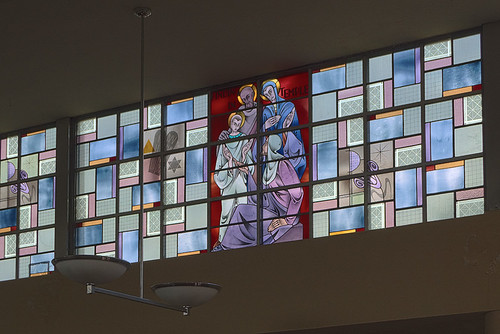
Stained glass windows in the clerestory depict the fifteen traditional mysteries of the Rosary; here is the Finding of the Christ Child in the Temple.
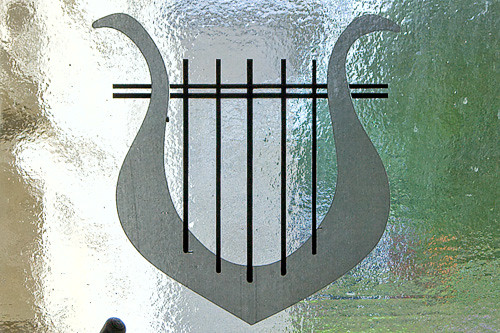
At the musicians' niche, a lyre is depicted in a window.
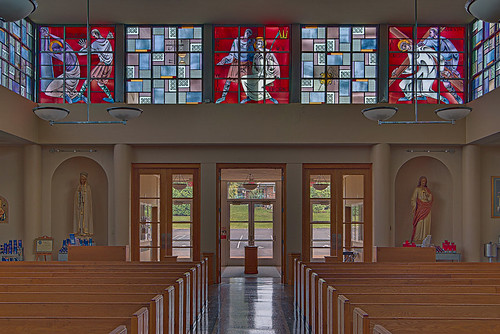
Sorrowful mysteries towards the back.
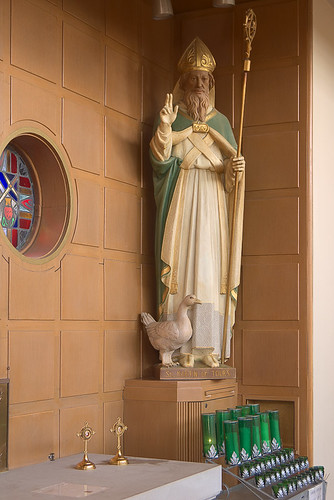
Relics, and a statue of Saint Martin of Tours (ca. 316 - ca. 397). Martin was a Roman soldier, then a holy monk, and then Bishop of Tours in Gaul. According to legend, Saint Martin went into hiding to avoid being made bishop, but a honking goose revealed his location.
Saint Martin has a traditional devotion in France, particularly by men. Whenever France sank into degeneracy and effeminacy — as it is today — renewed devotion to this great Saint led to a great national revival. We ought to remember that Armistice Day, Remembrance Day, or Veterans Day — November 11th — all have their root in Saint Martin's Day. Saint Martin de Tours, priez pour la France!
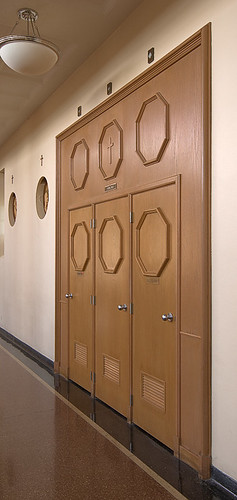
Confessional.

Holy oil.
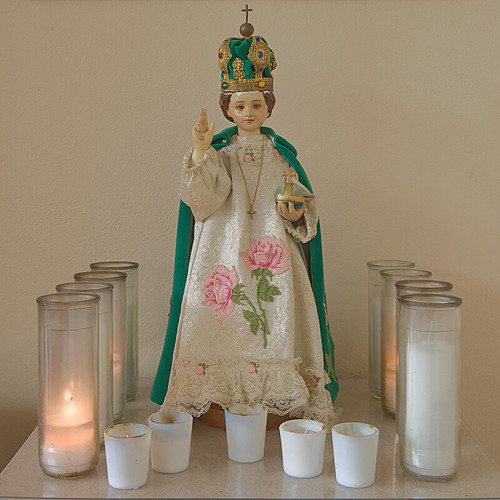
Infant Jesus of Prague.
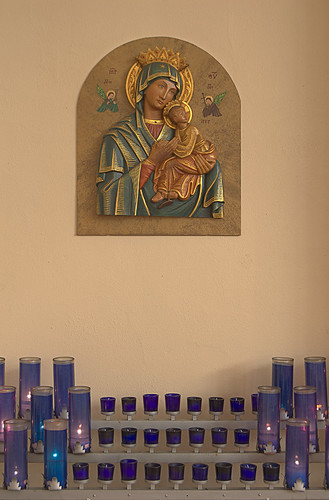
Our Mother of Perpetual Help.

A freshly-lit votive candle.
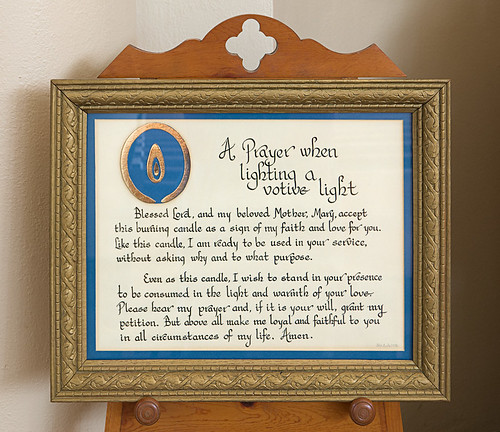
A prayer when lighting a votive candle.
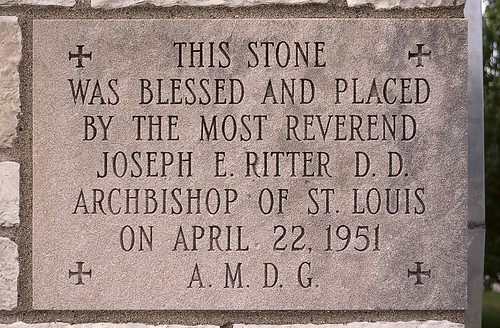
Address:
610 West Ripa Avenue
Saint Louis, Missouri 63125

The church appears to be made of native limestone, with aluminum trim: the architectural use of that metal became popular in Art Deco building, and continued with Modernism.

This church has a plan not much different than what is found in neo-Gothic buildings made half a century before, but uses the styling of Modernism. This was typical of the pre-Concilliar period, and this kind of artful High Modernism was quickly abandoned by the mid-1960s in favor of less Catholic designs.

The sanctuary is spartan, yet finely made, as was common during that era. Behind the tabernacle is a new stained glass window which shows the five Luminous Mysteries of the Most Holy Rosary of the Blessed Virgin Mary. The Luminous Mysteries were proclaimed by Pope John Paul II in October of 2002.

Nice linen covers the altar, which is supported by columns carved with acanthus leaves.

The tabernacle is stone with bronze doors depicting angels in adoration. On the base is the pious pelican, a Christological symbol of sacrificial love. Our Lord waits here in secret; perhaps we could spend some time with Him?

Stained glass windows in the clerestory depict the fifteen traditional mysteries of the Rosary; here is the Finding of the Christ Child in the Temple.

At the musicians' niche, a lyre is depicted in a window.

Sorrowful mysteries towards the back.

Relics, and a statue of Saint Martin of Tours (ca. 316 - ca. 397). Martin was a Roman soldier, then a holy monk, and then Bishop of Tours in Gaul. According to legend, Saint Martin went into hiding to avoid being made bishop, but a honking goose revealed his location.
Saint Martin has a traditional devotion in France, particularly by men. Whenever France sank into degeneracy and effeminacy — as it is today — renewed devotion to this great Saint led to a great national revival. We ought to remember that Armistice Day, Remembrance Day, or Veterans Day — November 11th — all have their root in Saint Martin's Day. Saint Martin de Tours, priez pour la France!

Confessional.

Holy oil.

Infant Jesus of Prague.

Our Mother of Perpetual Help.

A freshly-lit votive candle.

A prayer when lighting a votive candle.

☩ THIS STONE ☩WAS BLESSED AND PLACED
BY THE MOST REVEREND
JOSEPH E. RITTER D.D.
ARCHBISHOP OF ST. LOUIS
ON APRIL 22, 1951☩ A.M.D.G ☩Address:
610 West Ripa Avenue
Saint Louis, Missouri 63125
Friday, July 16, 2010
Relics of Mother Teresa
RELICS OF Mother Teresa were exposed for the veneration of the faithful, yesterday at Saints Teresa and Bridget Church in Saint Louis.
Born in Albania as Agnes Gonxha Bojaxhiu, Mother Teresa gained sanctity and worldwide fame as the foundress of the Missionaries of Charity, taking care of the “poorest of the poor” in the most poverty-stricken cities in the world.
Now she is venerated as Blessed Teresa of Calcutta.
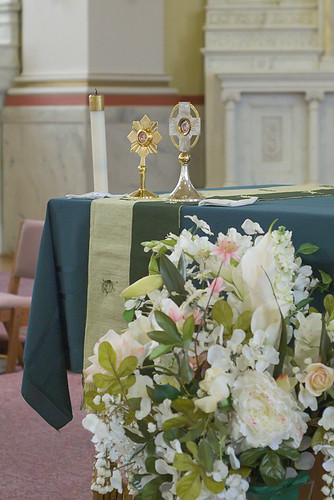
Reliquaries containing Teresa's blood and hair were placed on the altar.
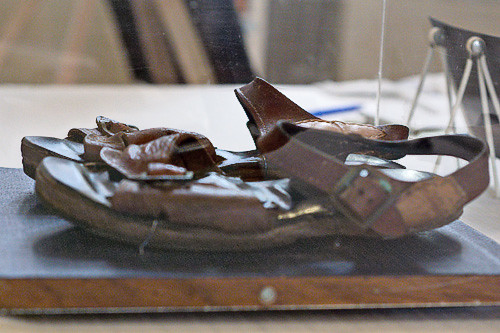
Her sandals.
I must apologize for the poor quality of these photos. I did not want to disturb the other faithful, and so I just took quick snapshots.
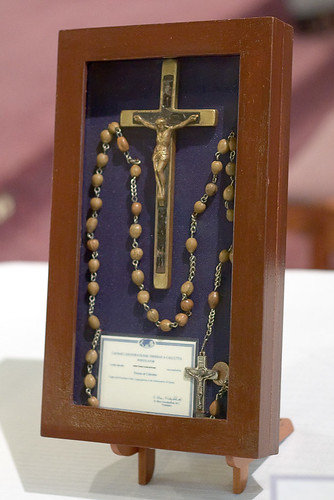
Her Crucifix and Rosary.
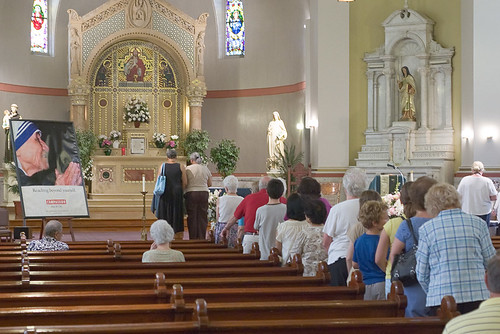
The faithful line up for veneration.
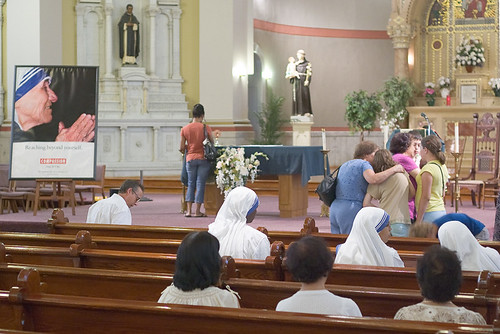
Some of Teresa's Sisters sit in a pew.
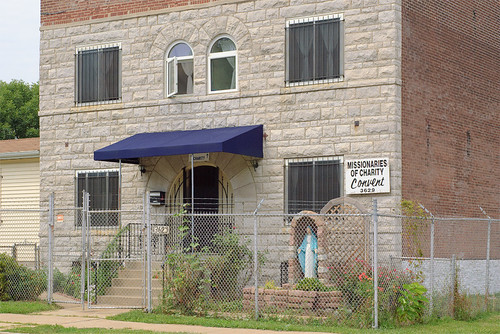
The Sisters' convent is located near the church.
“It is not the magnitude of our actions but the amount of love that is put into them that matters.” — Mother Teresa
Born in Albania as Agnes Gonxha Bojaxhiu, Mother Teresa gained sanctity and worldwide fame as the foundress of the Missionaries of Charity, taking care of the “poorest of the poor” in the most poverty-stricken cities in the world.
Now she is venerated as Blessed Teresa of Calcutta.

Reliquaries containing Teresa's blood and hair were placed on the altar.

Her sandals.
I must apologize for the poor quality of these photos. I did not want to disturb the other faithful, and so I just took quick snapshots.

Her Crucifix and Rosary.

The faithful line up for veneration.

Some of Teresa's Sisters sit in a pew.

The Sisters' convent is located near the church.
“It is not the magnitude of our actions but the amount of love that is put into them that matters.” — Mother Teresa
Sacred Heart Church in Peoria
A CORRESPONDENT SENT me a link to Sacred Heart Church in Peoria. They have recently completed a grand renovation of the interior. Click here to see pictures!
This is a Franciscan church. The followers of Saint Francis are known for severity of poverty and simplicity of life. However, Franciscan churches are traditionally glorious: they give the best things of Creation back to God.
This is a Franciscan church. The followers of Saint Francis are known for severity of poverty and simplicity of life. However, Franciscan churches are traditionally glorious: they give the best things of Creation back to God.
Thursday, July 15, 2010
Wednesday, July 14, 2010
Flower Photos at Shaw's Garden
SOME FLOWERS, found the other day at the Missouri Botanical Garden, in Saint Louis, popularly known as Shaw's Garden.














Tuesday, July 13, 2010
Photos of the Cathedral of Saint Mary, in Peoria, Illinois
HERE ARE PHOTOS of the exterior of the Cathedral of Saint Mary of the Immaculate Conception, in Peoria, Illinois. This is the Cathedral of the Diocese of Peoria, and is located 170 highway miles north of downtown Saint Louis, Missouri, and about 160 road miles southwest of the Loop in downtown Chicago. Peoria is the oldest city in Illinois, and has a population of over 100,000 souls.
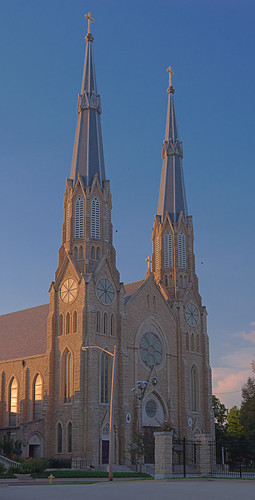
The cornerstone of this church was laid on June 28th, 1885. It was designed by Chicago architect Casper Mehler and built primarily by local labor under Mathias Schnell. A history of the church from the Peoria Public Library can be found here.
According to the Catholic Encyclopedia (1917):
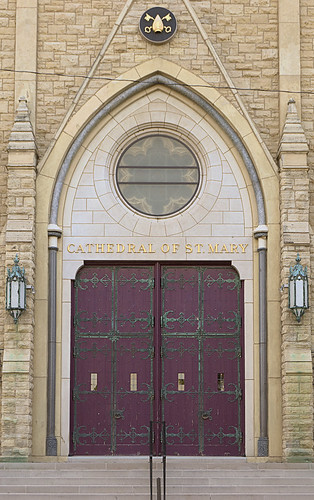
From the Public Library's history:
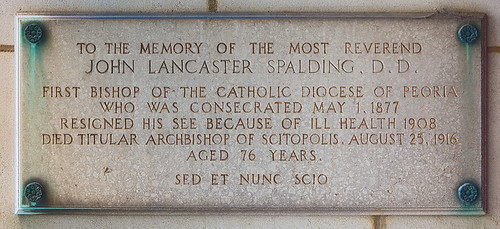
Memorial plaque to the first Bishop of the Dioecesis Peoriensis, J.L. Spalding.
From the Catholic Encyclopedia article:
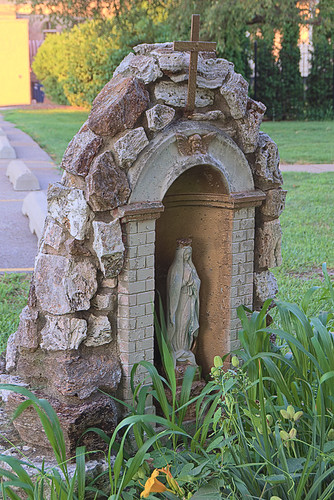
A little shrine to Mary, off of the parking lot.
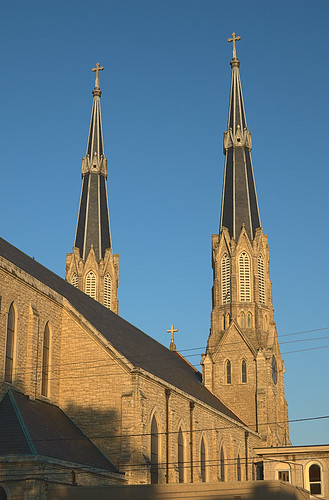
Alas, these photos were taken in the evening, and the church was locked, so I was unable to take photos of the interior.
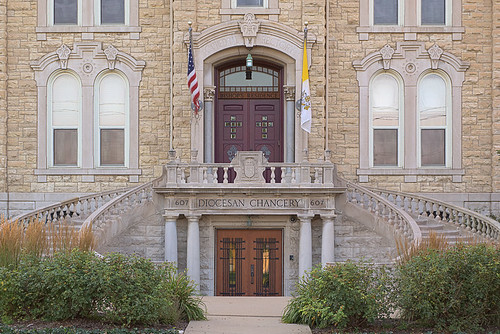
Cathedral Rectory, Bishop's Residence, Diocesan Chancery; located next to the Cathedral.
Peoria is one of six Latin Rite dioceses in the State of Illinois, and part of its territory was taken from the Archdiocese of Saint Louis. There are over 180 parishes in this diocese. The most popular patrons of parish churches here include Our Lady, with many under her title of the Immaculate Conception; the Sacred Heart of Jesus; Saint Joseph, foster-father of Our Lord; and Saint Patrick. The Jesuit missionaries of the 17th century had a great devotion to Our Lady and her Immaculate Conception, and so this title is found throughout the historically French colonial Mississippi Valley region in great numbers.
Archbishop Fulton J. Sheen, Servant of God, was ordained in here in 1919, and the cause of his canonization was opened by Bishop Daniel Jenky, C.S.C., the current Bishop of Peoria.
Blessed Teresa of Calcutta twice visited here, and a statue of her is found between the Rectory and Cathedral.
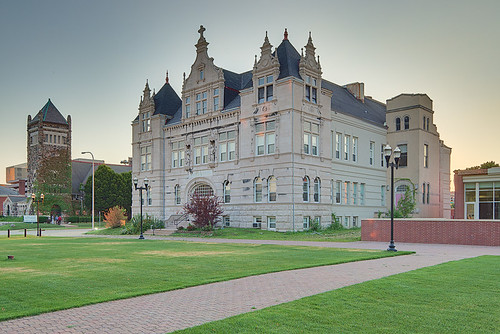
Near the Cathedral are various Diocesan buildings. This is the Spalding Institute, which was once a high school, and is now a part of the pastoral center. It dates from 1899, and its history can be found here.
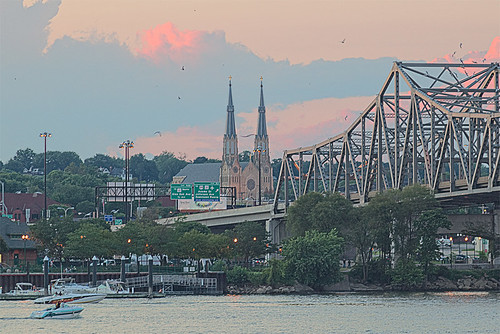
A view of the Cathedral from across the Illinois River.
Peoria is famously the most typical of Midwestern cities, and offers many surprises to ignorant visitors such as myself.
Address:
607 Northeast Madison Avenue
Peoria, Illinois 61603

The cornerstone of this church was laid on June 28th, 1885. It was designed by Chicago architect Casper Mehler and built primarily by local labor under Mathias Schnell. A history of the church from the Peoria Public Library can be found here.
According to the Catholic Encyclopedia (1917):
Catholicism in this region dates from the days of Father Marquette, who rested at the Indian village of Peoria on his voyage up the Illinois River in 1673. Opposite the present site of the episcopal city, La Salle and Tonti in 1680 built Fort Crèvecoeur, in which Mass was celebrated and the Gospel preached by the Recollect Fathers, Gabriel Ribourdi, Zenobius Membré, and Louis Hennepin. With some breaks in the succession, the line of missionaries extends to within a short period of the founding of modern Peoria. In 1839 Father Reho, an Italian, visited Peoria, remaining long enough to build the old stone church in Kickapoo, a small town twelve miles distant. St. Mary's, the first Catholic church in the city proper, was erected by Father John A. Drew in 1846. Among his successors was the poet, Rev. Abram J. Ryan.Peoria is named after the Peouarea Tribe, one of the five tribes of the Algonquin Illinois Confederacy.
Many of the early Irish immigrants came to work on the Illinois and Michigan canal; owing to the failure of the contracting company, they received their pay in land scrip instead of cash, and were thus forced to settle upon hitherto untilled farm-land. These Irish farmers, with the Germans who began to arrive a little later, were the pioneer Catholics whose descendants now constitute the strength of the Church. In more recent years Poles, Slavonians, Clovenians, Croatians, Lithuanians, and Italians have come in considerable numbers to work in the coal mines...

From the Public Library's history:
The building was to be in the Gothic Style and dominate the area. The two spires climb two hundred feet from the sidewalk and the towers are massive, reaching a height of 76 feet. Fourteen by twenty-eight foot massive doors would adorn the main part of the church, which would be 85 by 76 feet in dimension. Since that glorious day the mighty Saint Mary Cathedral has been a beacon to visitors and the symbol of a city that has always been a wonderful place to raise a family. The church, because of the stately trees and the park like setting is even more beautiful than it was way back there in 1885.

Memorial plaque to the first Bishop of the Dioecesis Peoriensis, J.L. Spalding.
From the Catholic Encyclopedia article:
Rt. Rev. John Lancaster Spalding was consecrated first Bishop of Peoria, 1 May, 1877. Born of the distinguished Spalding family, in Lebanon, Kentucky, in 1840, and educated at Bardstown, Mount St. Mary's, Emmittsburg, Louvain, and Rome, his career as paster in Louisville, Kentucky, as orator, and as author had been marked by signal successes. The promise of his earlier life was more than fulfilled by the long years of his episcopate. Besides creating a new spirit in the Catholic life of the diocese, which found expression in new churches, schools, and institutions of education and charity, he sought fields of larger efforts for his zeal. He laboured earnestly in the cause of Catholic colonization in the West. He preached the truths of life to an ever-increasing and deeply appreciative audience of American people. He ranks high among the educators of the country. The Catholic University of America owes its origin largely to his zeal. Spalding Institute, Peoria, a Catholic school for boys, built and equipped by his generosity, is another monument to his abiding faith in education. His writings are assured of permanent use and admiration by future generations. At the height of his usefulness he was stricken with paralysis on 6 Jan., 1905, and resigned the see, 11 Sept., 1908, residing in Peoria as Archbishop of Scitopolis, to which honour he was raised in 1909.

A little shrine to Mary, off of the parking lot.

Alas, these photos were taken in the evening, and the church was locked, so I was unable to take photos of the interior.

Cathedral Rectory, Bishop's Residence, Diocesan Chancery; located next to the Cathedral.
Peoria is one of six Latin Rite dioceses in the State of Illinois, and part of its territory was taken from the Archdiocese of Saint Louis. There are over 180 parishes in this diocese. The most popular patrons of parish churches here include Our Lady, with many under her title of the Immaculate Conception; the Sacred Heart of Jesus; Saint Joseph, foster-father of Our Lord; and Saint Patrick. The Jesuit missionaries of the 17th century had a great devotion to Our Lady and her Immaculate Conception, and so this title is found throughout the historically French colonial Mississippi Valley region in great numbers.
Archbishop Fulton J. Sheen, Servant of God, was ordained in here in 1919, and the cause of his canonization was opened by Bishop Daniel Jenky, C.S.C., the current Bishop of Peoria.
Blessed Teresa of Calcutta twice visited here, and a statue of her is found between the Rectory and Cathedral.

Near the Cathedral are various Diocesan buildings. This is the Spalding Institute, which was once a high school, and is now a part of the pastoral center. It dates from 1899, and its history can be found here.

A view of the Cathedral from across the Illinois River.
Peoria is famously the most typical of Midwestern cities, and offers many surprises to ignorant visitors such as myself.
Address:
607 Northeast Madison Avenue
Peoria, Illinois 61603

